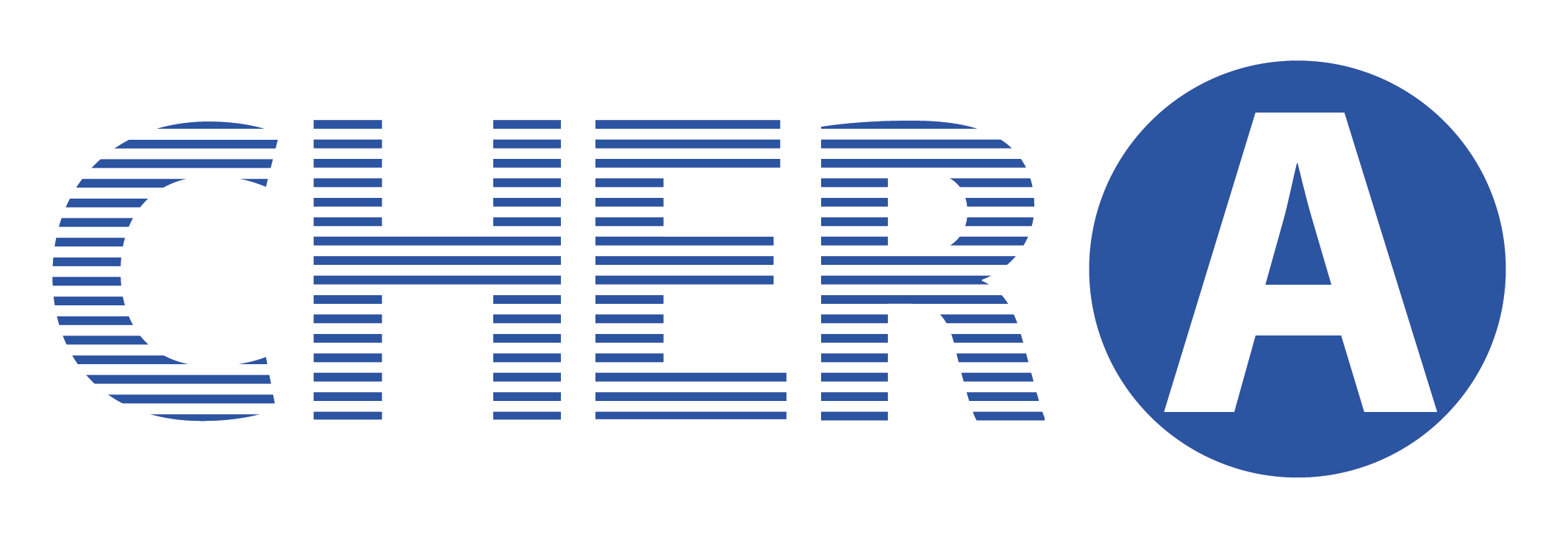Internationalisation: Optimising Student Experience
15-16 May, 2019
Cheng Yu Tung Blog, Chinese University of Hong Kong
Keynote speaker:
- Prof. Elspeth Jones, Emerita Professor, Leeds Becket University
- Prof. Wendy Green, University of Tasmania
- Prof. Gerard Postiglione, University of Hong Kong
Themes:
- Internationalising the curriculum
- Internationalising the campus
- Language, culture, and internationalisation
- ‘Unpacking’ international education experience
In Search of Excellence: Chinese Students on the Move
29 November 2018 (Thursday)
15:00 – 16:30
Room 205, Runme Shaw Building, HKU
Co-Chair: Ewan Wright and Gerard Postiglione
DESCRIPTION
In this seminar, the Bright Futures team present a report that draws on the first representative sample survey of Chinese undergraduate and masters students studying in the UK, with comparisons drawn from control groups of Japanese and UK home students at the same levels of study, a parallel survey conducted in Germany, as well as a survey of Chinese HE students in China. Key findings include that Chinese students studying in Europe are more heterogeneous than has been assumed, and more similar to their peers in Europe and at home in China than expected. We explore this heterogeneity and convergence in the UK context, with comparisons to UK home and Japanese students. We also look at some of the characteristics related to choice of study location across the dataset. The report covers a range of issues, including family and academic background, motivations for overseas study and experience in the UK. More information about the study is available at:www.brightfutures-project.com.
‘Bright Futures‘ is a pioneering study investigating East Asian students moving for HE—one of the most intense flows of educational migrations. Starting in 2015, the project is a three-country collaborative project involving four universities (University of Essex, University of Edinburgh, Bielefeld University, and Tsinghua University) funded by the Economic and Social Research Council (UK), German Research Foundation (Germany), and the National Natural Science Foundation (China). The project’s principal investigator is Prof. Yasemin Soysal at the University of Essex.
This unique research is the first to produce a representative sample survey (with over 7,000 valid respondents) of one of the most important flows of international students globally: from China (the largest sending country) to the UK (the second largest destination after the US) and Germany (the second largest destination in Europe).
~ All are welcome ~
The seminar is hosted by CHERA, The Consortium for Higher Education Research in Asia, University of Hong Kong
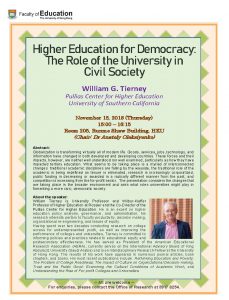
Higher Education for Democracy: The Role of the University in Civil Society
William G. Tierney
Pullias Center for Higher Education
University of Southern California
November 15, 2018 (Thursday)
15:00 – 16:15
Room 205, Runme Shaw Building, HKU
(Chair: Dr Anatoly Oleksiyenko)
Abstract:
Globalization is transforming virtually all of modern life. Goods, services, jobs, technology, and information have changed in both developed and developing countries. These forces and their impacts, however, are neither well understood nor well examined, particularly as how they have impacted tertiary education. What seems to be taking place is a myriad of interconnected changes: traditional academic disciplines are falling by the wayside, the traditional role of the academic is being redefined as tenure is eliminated, research is increasingly corporatized, public funding is decreasing or awarded in a radically different manner from the past, and competition is increasing from the for-profit sector. The presentation considers the changes that are taking place in the broader environment and asks what roles universities might play in fomenting a more civic, democratic society.
About the speaker:
William Tierney is University Professor and Wilbur-Kieffer Professor of Higher Education at Rossier and the Co-Director of the Pullias Center for Higher Education. He is an expert on higher education policy analysis, governance, and administration; his research interests pertain to faculty productivity, decision making, organizational re-engineering, and issues of equity.
Having spent over two decades conducting research on college access for underrepresented youth, as well as improving the performance of colleges and universities, Tierney is committed to informing policies and practices related to educational equity and postsecondary effectiveness. He has served as President of the American Educational Research Association (AERA), currently serves on the International Advisory Board of King Abdulaziz University (Saudi Arabia) and is an Interdisciplinary Research Fellow at the University of Hong Kong. The results of his work have appeared in numerous journal articles, book chapters, and books. His most recent publications include: Rethinking Education and Poverty; The Problem of College Readiness; The Impact of Culture on Organizational Decision-making, Trust and the Public Good: Examining the Cultural Conditions of Academic Work, and Understanding the Rise of For-profit Colleges and Universities.
~ All are welcome ~
For enquiries, please contact the Office of Research at 3917 8254.
Impact of organizational factors on research agendas and academic profession in universities
Dr Hugo Horta, The University of Hong Kong
Dr. Jae Park, The Education University of Hong Kong
Wednesday, 11 July 2018
10:30-12:00
Tokyo Gakugei University
In current neoliberally driven universities, research work is assessed increasingly based on quantitative indicators and social-engineered, often top-down, policies drawn on corporate type beliefs that are expected to lead to the greatest impact possible. These policies influence not only knowledge production and its potential relevance, but also design a new playing field for careers (tenure, promotion as examples). Contrarily to such beliefs and trends, the findings of a study by Dr Hugo Horta will show that the most risk-taking, ambitious, and multidisciplinary research agendas (i.e, the ones that will most likely lead to knowledge breakthroughs) are associated with organizations that foster sense of academic autonomy and environments conductive to social satisfaction. Sense of belonging and satisfaction with the organizational leadership (critical factors in corporations) have little to no association with research agendas, underlining the different environment that universities represent when compared with corporations. Showcasing Hong Kong universities, Dr Jae Park will discuss about the impact of a wide range of neoliberal forces on the teaching/research profession in universities. The academic professionals are, in his view, both victims and perpetrators of their own belittlement, which in turn negatively affect university’s impact on the society, relevance of knowledge produced, academic freedom and, above all, the self-realization of academics themselves.
Improving, struggling or losing steam?
An analysis of the research systems in Hong Kong and Singapore.
Hugo Horta, The University of Hong Kong
Tuesday, 3 July 2018
10:30-12:00
Tohoku University
Outline:
At a time when the knowledge race is at its most intense, the scientific wealth of nations is increasingly relevant to ensure the preparedness and competitiveness of societies in a globalized, increasingly uncertain, and integrated global knowledge economy. The scientific wealth of nations also helps them become resilient in the face of ever-growing knowledge and technological shifts. Hong Kong and Singapore, which are multicultural, internationalized, and capitalist territories, have been part of globalization since its beginning, and they are renowned for their vibrant research communities. However, given that East Asia and Southeast Asia are becoming worldwide centers of research power and are facing increasing regional competitiveness, a persistent question is whether the two territories are keeping up with the competition and are key players in the global knowledge race. Analysis of their knowledge creation and worldwide impact over the past 20 years indicates that these two territories are struggling to keep up and are showing declining competitiveness. This loss of competitiveness, including in major thematic areas, such as Decision Sciences and Business, in which they had substantial leads in the past, is making these territories indistinguishable from others as knowledge centers, and they are thus potentially less visible and less appealing to investors. As they continue to be highly internationalized, the main reason behind these trends seems to be related to critical underinvestment in their research systems.
About the Speaker:
Dr. Hugo Horta is an Assistant Professor at the Faculty of Education of the University of Hong Kong since September 2014. After completing his Ph.Din Management and Industrial Engineering at the Instituto Superior Tecnico(IST), Technical University of Lisbon, in 2007 (part of it performed in the Netherlands and in the US), and a postdoctoral spell in Tohoku University, Japan, he worked as Advisor to the Portuguese Secretary of State of the Ministry of Science, Technology and Higher Education, from 2010 to 2011. He also served as the Portuguese National delegate to the ERA Steering Committee on Human Resources and Mobility until 2014, chairing the ERA Working Group “Grant Portability”, which analyzed the possibility to establish a grant portability scheme among European countries. He has published more than 50 publications on topics such as higher education diversity, science policy and funding, research productivity and networking, doctoral career trajectories, internationalization of higher education, and academic mobility He is currently Coordinating-editor at Higher Education, a leading journal of higher education studies, and sits in the advisory editorial boards of the Higher Education Policy, Higher Education Management and Policy, and Asian Pacific Education Review. He is recently co-edited two books: a book on Trends and Challenges in Science and Higher Education: Building Capacity in Latin America with Manuel Heitorand Jamil Salmi, and other book on Researching Higher Education in Asia: History, Development and Future with Akiyoshi Yonezawa and Jisun Jung.
What can we learn about the skill-push policies from the viewpoint of doctoral student’s self-perceptions of skills associated to career preferences: the case of 3 flagship universities in Asia.
Hugo Horta, The University of Hong Kong
Tuesday, 26 June 2018
15:00-16:30
Room112, RIHE, Hiroshima University
Doctoral studies have been changing, and although a PhD continues to be a degree mostly focused on research, it has been shaped to confer PhD students with broader sets of skills, intended to prepare them for jobs outside the academic sector. This has changed the form, content and shape of traditional PhD programs and led to the creation of more professionally oriented streams in doctoral education. This change results from two intertwined trends. First, the interest of students to continue their studies at the PhD level, a trend that is complemented by the universities (and governments) interest in having a highly qualified student population that can boost knowledge production, with multiple benefits (including the leveraging of national universities in the world global university rankings). Second, the traditional job market for PhDs, the academic job market, has been seeing throughout the world a decreasing number of professoriate positions relative to a growing massification of doctorates. This dynamic is to continue, even if the result so far is an increased number of PhD holders in contingent, precarious positions rather than unemployment. This research looks at PhD students at National University of Singapore, The University of Hong Kong, and Seoul National University, and analyses the determinants that shape the preferences for them to choose career paths outside academia upon conclusion of their PhD. The findings will be particularly focused around the results concerning self-perception of skills acquired during the doctoral studies and how these may be influencing them to pursue career choices in or out of academia. The findings contribute to the academic literature (studies of this nature in Asia are scarce) but also possibly raise policy implications about the emphasis given to the skilled-push efforts.
Research Institute for Higher Education (RIHE)
http://rihe.hiroshima-u.ac.jp/en/
What factors influence PhD students’ intentions to work outside academia?
Thursday, 26 Apr 2018 | 12:30 – 14:00 | Room 828, UCL Institute of EducationHugo Horta, University of Hong KongOverview
Doctoral studies have been changing, and although a PhD continues to be a degree mostly focused on research, it has been shaped to confer PhD students with broader sets of skills, intended to prepare them for jobs outside the academic sector.
This change results from two intertwined trends. First, the transformation of universities into engines of knowledge, associated with rising audit cultures (mostly based on metrics), stagnating public funding, and the relevance of the research mission.
Second, the traditional job market for PhDs, the academic job market, has been seeing throughout the world a decreasing number of professoriate positions relative to a growing massification of doctorates. Universities benefit from having PhD students, and students demand PhD degrees. This dynamic is to continue, even if the result so far is an increased number of PhD holders in contingent, precarious positions.
This research looks at PhD students at three Asian flagship universities (National University of Singapore, The University of Hong Kong, and Seoul National University) and analyses the determinants that shape the preferences for them to choose career paths outside academia upon conclusion of their PhD.
The findings are expected to contribute not only to the academic literature (studies of this nature in Asia are scarce) but also possibly raise polemic policy implications.
Booking
All seminars are free and open to the public. No advance booking required.
Note
You can register to watch the livestream of this seminar.
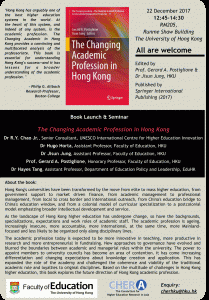
The Changing Academic Profession in Hong Kong
22 December 2017
12:45-14:30
RM205, Runme Shaw Building, HKU
A Book Launch & Seminar by
Dr R.Y. Chao Jr., Senior Consultant, UNESCO International Centre for Higher Education
Dr Hugo Horta, Assistant Professor, Faculty of Education, HKU
Dr Jisun Jung, Assistant Professor, Faculty of Education, HKU
Prof. Gerard A. Postiglione, Honorary Professor, Faculty of Education, HKU
Dr Hayes Tang, Assistant Professor, Department of Education Policy and Leadership, EduHK
About the book:
Hong Kong’s universities have been transformed by the move from elite to mass higher education, from government support to market driven finance, from academic management to professional management, from local to cross border and international outreach, from China’s education bridge to China’s education window, and from a colonial model of curricular specialization to a postcolonial model emphasizing broader intellectual development and service.
As the landscape of Hong Kong higher education has undergone change, so have the backgrounds, specializations, expectations and work roles of academic staff. The academic profession is ageing, increasingly insecure, more accountable, more international, at the same time, more Mainland-focused and less likely to be organized only along disciplinary lines.
The academic profession today is expected to be more innovative in teaching, more productive in research and more entrepreneurial in fundraising. New approaches to governance have evolved and blurred the boundaries between academic and managerial roles within the university. The power to appoint members to university councils has become an area of contention. It has come increasing differentiation and changing expectations about knowledge creation and application. This has expanded the role of the academy and challenged the coherence and viability of the traditional academic role and loyalties to original disciplines. Based on the multitude of challenges in Hong Kong higher education, this book explores the future direction of Hong Kong academic profession.
Enquiry: 3917 8012
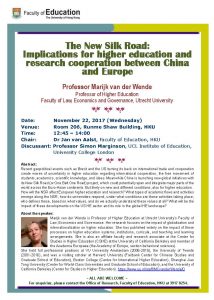
The New Silk Road:
Implications for higher education and research cooperation between China and Europe
Professor Marijk van der Wende
Professor of Higher Education
Faculty of Law, Economics and Governance, Utrecht University
November 22, 2017 (Wednesday)
Room 206, Runme Shaw Building, HKU
12:45 – 14:00
Chair: Dr Jan van Aalst
Discussant: Professor Simon Marginson
Abstract:
Recent geopolitical events such as Brexit and the US turning its back on international trade and cooperation create waves of uncertainty in higher education regarding international cooperation, the free movement of students, academics, scientific knowledge, and ideas. Meanwhile China is launching new global initiatives with its New Silk Road (or One Belt One Road) project, which could potentially span and integrate major parts of the world across the Euro-Asian continents. But likely on new and different conditions, also for higher education. How will the NSR affect European higher education and research? What types of academic flows and activities emerge along the NSR, how do universities respond, under what conditions are these activities taking place, who defines these, based on what values, and do we actually understand these values at all? What will be the impact of these developments on the US HE sector and its role in the global HE landscape?
About the speaker:
Marijk van der Wende is Professor of Higher Education at Utrecht University’s Faculty of Law, Economics and Governance. Her research focuses on the impact of globalization and internationalization on higher education. She has published widely on the impact of these processes on higher education systems, institutions, curricula, and teaching and learning arrangements. She is also an affiliate faculty and research associate at the Center for Studies in Higher Education (CSHE) at the University of California Berkeley and member of the Academia Europaea (the Academy of Europe, section behavioral sciences). She held full professorial positions at VU University Amsterdam (2006-2015), the University of Twente
(2001-2016), and was a visiting scholar at Harvard University (Fairbank Center for Chinese Studies and Graduate School of Education), Boston College (Centre for International Higher Education), Shanghai Jiao Tong University (Center for World-Class Universities and Graduate School of Education), and the University of California Berkeley (Center for Studies in Higher Education). https://www.uu.nl/staff/MCvanderWende/0
For enquiries, please contact the Office of Research, Faculty of Education, HKU at 3917 8254.

Innovation in the Liberal Arts and Sciences in China: Six Recommendations to Shape the Future
Dr Noah Pickus
Associate Provost and Senior Advisor to the Provost, Duke University
Dean of Undergraduate Curricular Affairs and Faculty Development, Duke Kunshan University
16 November 2017 (Thu)
12:30 – 14:00
RM206, Runme Shaw Building, The University of Hong Kong
Registration: http://bit.ly/innoinchina
Abstract
In the last decade, Mainland China and Hong Kong have witnessed significant growth in university programs and schools that emphasize the liberal arts and sciences. There are, however, significant obstacles that impede this growth. Obstacles include general confusion over the meaning of the liberal arts; doubts about its value and relevance; the low quality and limited reach of current offerings; a lack of qualified faculty; formal metrics and incentives that hamper educational innovation; bureaucratic resistance; difficulties in scaling programs; the need for new ways of teaching about Chinese, Western, and other cultures, traditions, and values; and the fact that Mainland Chinese institutions are still overseen by important political forces that are ambivalent about the virtues of liberal arts and sciences education for Chinese university students. This talk highlights six key recommendations to overcome these obstacles and to realize the potential for the liberal arts and sciences in China. These recommendations emerged from a gathering of university leaders and scholars at Duke Kunshan University (DKU) in June, 2017 and are contained in report released in November, 2017: make general education matter; invest in interdisciplinary integration; focus on faculty incentives and development; embrace innovative pedagogy; scale quality programs; and study multiple traditions.
Speaker’s Bio
Noah Pickus is Associate Provost and Senior Advisor to the Provost at Duke University and Dean of Undergraduate Curricular Affairs and Faculty Development at Duke Kunshan University. Prior to serving in these roles, he was the Nannerl O. Keohane Director of the Kenan Institute for Ethics at Duke University and the founding Director of the Institute for Emerging Issues at NC State University. At Duke, he focuses on strategic planning, learning innovation, and policy engagement and co-authored Duke’s new Strategic Plan: Together Duke. At DKU, he led the design of an innovative, interdisciplinary, and problem-based undergraduate curriculum and is responsible for hiring a new faculty, implementing the curriculum, and developing innovative pedagogical approaches. He has taught at Middlebury College and in China and Israel. He was an American Council on Education Fellow at Franklin & Marshall College and is currently a lead curriculum designer for the Arizona State University-Georgetown University Academy for Innovation in Higher Education Leadership. An Associate Research Professor of Public Policy, Pickus co-directed the Brookings-Duke Immigration Policy Roundtable and is the author of True Faith and Allegiance: Immigration and American Civic Nationalism (Princeton) and Immigration and Citizenship in the 21st Century (Rowman & Littlefield), as well as essays on ethics and public affairs education, and policy reports on liberal arts education in China, U.S. immigration policy, and innovation in higher education. He has held fellowships from the Thomas J. Watson Foundation, the A.W. Mellon Foundation, and the H.B. Earhart Foundation. He received a bachelor’s degree in the College of Social Studies at Wesleyan University and a doctorate in politics from Princeton University.
Enquiry: 3917 8012 / chinaed@hku.hk
Registration: http://bit.ly/innoinchina
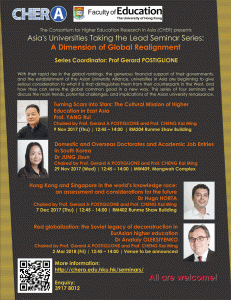 | Asia’s Universities Taking the Lead Seminar Series: A Dimension of Global Realignment Chaired by Prof Kai-ming Cheng and Prof Gerard PostiglioneWith their rapid rise in the global rankings, the generous financial support of their governments, and the establishment of the Asian University Alliance, universities in Asia are beginning to give serious consideration to what it is that distinguishes them from their counterparts in the West, and how they can serve the global common good in a new way. This series of four seminars will discuss the main trends, potential challenges, and implications of the Asian university renaissance. |
Turning Scars into Stars: The Cultural Mission of Higher Education in East Asia
Prof. YANG Rui
Chaired by Prof Kai-ming Cheng and Prof Gerard Postiglione
9 Nov 2017 (Thu) | 12:45 – 14:00 | RM204 Runme Shaw Building
As a latecomer to modernization, East Asia has prioritized Western learning since the late 19th century. Universities were created to serve such a purpose with little linkage to their indigenous cultural traditions. Modelled on European and North American experiences while operating in Confucian socio-cultural contexts, modern universities in East Asia have been struggling with their cultural identity.
Over recent decades, higher education in East Asia has made impressive progress especially in comparison with other non-Western societies. Cultural experiment has been placed highly on the agenda. Based on fieldwork at top universities in Beijing, Taiwan, Singapore and Hong Kong, Yang Rui’s research findings about higher education development in East Asia finds that both indigenous and Western traditions are incorporated deeply into the daily operations of elite East Asian universities, which appear increasingly able to turn scars into stars.
Unlike their prestigious cousins in the West, who have a poor knowledge of other parts of the world, East Asian academic elites know the West as well as their own societies. While Western universities operate in a largely mono-cultural environment, East Asia’s flagship universities work in a combined culture that includes at least East Asia and the West. Such a combination opens spaces for East Asian universities to explore an alternative to Western models that have been dominant globally since the industrialization of the West. It is globally significant and historically unprecedented.
Domestic and Overseas Doctorates and Academic Job Entries in South Korea
Dr JUNG Jisun
Chaired by Prof Kai-ming Cheng and Prof Gerard Postiglione
29 Nov 2017 (Wed) | 12:45 – 14:00 | MW409, Mengwah Complex
One of the most significant achievements in Asian higher education was made in doctoral education system and its contribution to the knowledge production.
This study explores the development and challenges of doctoral education in Korea. Korean universities have continued to rely on candidates with overseas training due to the limited capacity of the domestic doctoral education system until early 1980s. However, with strong government policies to support national doctoral education system since 1990s, the number of domestic PhD graduates who have a high research capacity have been increased.
The study focuses on the differences between overseas and domestic doctorates in terms of training, supply and demand in the academic workforce, in addition to their academic entry-level jobs and employment status. The study applied document analysis based on secondary data sources such as the Statistical Yearbooks of Education, Annual Science and Technology Statistics, the Database for Overseas Doctorates Registration and OECD data.
Although the national doctoral education system had made remarkable achievements in terms of both size and quality, the study finds that the growth of the doctoral education system in Korea is still reliant on overseas doctorates and there are strong preference to hire overseas doctorates in major research universities.
Hong Kong and Singapore in the world’s knowledge race: an assessment and considerations for the future
Dr Hugo HORTA
Chaired by Prof Kai-ming Cheng and Prof Gerard Postiglione
7 Dec 2017 (Thu) | 12:45 – 14:00 | RM402 Runme Shaw Building
In the past decades, the mantra of the knowledge society has been related to the importance of knowledge production and dissemination to foster innovation processes that feed the competition of organizations, countries and regions in a fast changing, dynamically interconnected global economy, but also to promote social and economic development. Nations entered a knowledge-race and set incentives to produce more and better knowledge to a large extent linked to still rather simplistic linear innovation models, supported by a globalist human capital rhetoric, and backed-up by international organizations.
The results of these policies – related also to the populations themselves realizing its relevance – can be easily discerned by the increase of qualifications of the population, the numbers of students enrolled in higher education, and the mounting number of publications produced. While this process further evidenced known asymmetries in the knowledge arena, the competition for knowledge may be shifting traditional poles of scientific power in Asia.
The rise of China is an example of the latter, but this research assesses two other poles: Hong Kong and Singapore. Both are relatively small in the size of their territories, played (and play) a relevant role in the social and economic development of their regions (considering their territorial or population size), were former colonial British territories, advertise themselves as trade and knowledge hubs, are wealthy financial centers with dynamic economies and are urban world cities. This research will analyze the competitiveness of the knowledge production of these two poles in relation to the world in the past 20 years. Then it will discuss the factors that may explain their current situation, and draw policy implications.
Red globalization: the Soviet legacy of deconstruction in EurAsian higher education
Dr Anatoly OLEKSIYENKO
Chaired by Prof Kai-ming Cheng and Prof Gerard Postiglione
2 Mar 2018 (Fri) | 12:45 – 14:00 | Venue to be announced
Following World War II, the Soviets laboured across Eurasia to deconstruct the western idea and model of the university. They turned universities into “knowledge factories” by obliterating the Humboldtian principles of “freedom to teach” and “freedom to learn”, instituting censorship, disrupting academic succession rites to prioritize recruitment of loyal professionals with proletarian credentials, establishing “one-man management” and “army uniformity”, eradicating creativity and purging dissenters, regimenting student activities, and encouraging snitching.
To destroy the western model, the Soviets broke down many universities into small specialized institutes reporting to specific industries. The specialized institutes were easier to control, their staff and students easily deployed to spread Marxism-Leninism in the labor silos of the planned economy. To prop up all of these developments, anti-western rhetoric was essential – it enabled the obliteration of the value of the university as an institution of autonomy and academic freedom in higher learning. Moreover, it made it possible to attract support from authoritarian regimes worldwide, many of whom became “brotherly states” over time.
Russification became a key instrument for many Soviet professors to seed “sustainable international friendship” and serve the global mission of the “great Russian culture” and “socialist motherland”. The Soviet deconstruction strategy was promoted both in the west (e.g., Poland, Czech Republic, and East Germany) and in the east (e.g., China, Mongolia, Vietnam and Cambodia). Given that the Soviet quasi-academic practices are impacting the course of global neoliberalism, it is worth re-discovering the historical legacies of red globalization in higher education.
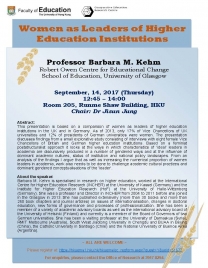
Women as Leaders of Higher Education Institutions
Date: September, 14, 2017 (Thursday)
Time: 12:45 – 14:00
Venue: Room 205, Runme Shaw Building, HKU
Chair: Dr Jisun Jung
Abstract: This presentation is based on a comparison of women as leaders of higher education institutions in the UK and in Germany. As of 2013, only 17% of Vice Chancellors of UK universities and 12% of presidents of German universities were women. The presentation discusses findings from a small explorative study consisting of interviews with eight female Vice Chancellors of British and German higher education institutions. Based on a feminist poststructuralist approach it looks at the ways in which characteristics of ‘ideal’ leaders in academia are discursively produced in a number of gendered ways and at the influence of dominant academic cultures, status of institution and national policy landscapes. From an analysis of the findings I argue that as well as increasing the numerical proportion of women leaders in academia, work also needs to be done to challenge academic cultural practices and dominant gendered conceptualisations of the ‘leader’.
About the Speaker: Barbara M. Kehm is specialised in research on higher education, worked at the International Centre for Higher Education Research (INCHER) at the University of Kassel (Germany) and the Institute for Higher Education Research (HoF) at the University of Halle-Wittenberg (Germany). She was a professor and Director in INCHER from 2004 to 2011 before she joined in the Glasgow in 2013. She has published extensively (more than 30 books and more than 250 book chapters and journal articles) on issues of internationalisation, changes in doctoral education, new forms of governance and processes of professionalization. She has been a member of a variety of academic advisory boards as well as the international advisory board of the University of Helsinki (Finland) and currently is a member of the Board of Governors of two German universities. She has been a visiting professor at the University of Damaskus (Syria), RMIT Melbourne (Australia), South West Jiaotong University in Chengdu and BUAA in Beijing (China), the Catholic University in Santiago (Chile) and the National University of Buenos Aires (Argentina).
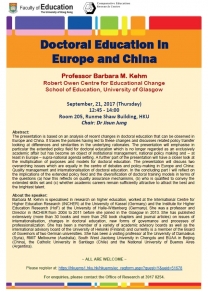
Doctoral Education in Europe and China
Date: September, 21, 2017 (Thursday)
Time: 12:45 – 14:00
Venue: Room 205, Runme Shaw Building, HKU
Chair: Dr Jisun Jung
Abstract: The presentation is based on an analysis of recent changes in doctoral education that can be observed in Europe and China. It traces the policies having led to these changes and discusses related policy transfer looking at differences and similarities in the underlying rationales. The presentation will emphasise in particular the extended policy field for doctoral education which is no longer regarded as an exclusively academic affair but has become an object of institutional management, national policy making and – at least in Europe – supra-national agenda setting. A further part of the presentation will have a closer look at the multiplication of purposes and models for doctoral education. The presentation will discuss two overarching issues which are equally in the centre of debates and policy-making in Europe and China: Quality management and internationalisation of doctoral education. In the concluding part I will reflect on the implications of the extended policy field and the diversification of doctoral training models in terms of the questions (a) how this reflects on quality assurance mechanisms, (b) who is qualified to convey the extended skills set and (c) whether academic careers remain sufficiently attractive to attract the best and the brightest talent.
